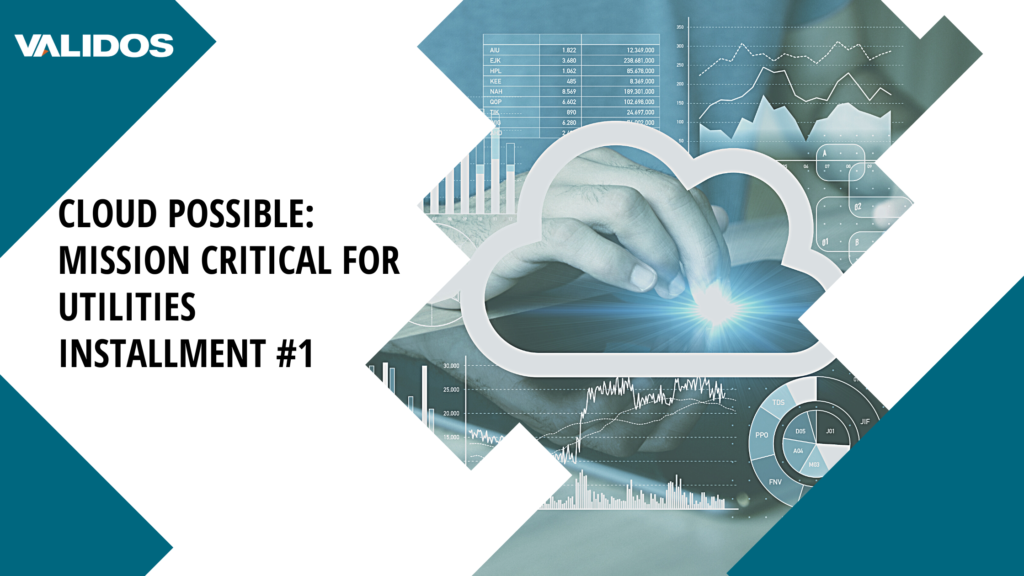Cloud Possible: Mission Critical for Utilities – Installment #1

Private Cloud vs. Public Cloud
Utilities are faced with some formidable challenges – aging infrastructure and applications, supported by an aging workforce; a new generation of consumers with higher than ever expectations for self-service and innovative product offerings; new and increased regulatory pressures, and pressure to increase operational efficiency while reducing O&M costs. Combine that with increased pressure to maintain revenues when big box and online retailers are selling energy generation technology – like solar panels – straight to consumers and it’s easy to see why utilities must begin to take a different and more aggressive approach with modern platforms, capabilities and services. The rise in cloud capability, with multiple deployment and service models, make these challenges well within the range of manageable, even for mission critical applications like CIS and ERP. An updated business and technology strategy, thoughtfully including cloud, is a meaningful first step.
Increase in cloud adoption Increase in cloud adoption
Utilities have seen a significant increase in cloud adoption in just the past 3 years.
TMG Consulting, a well-respected thought leader focused on CIS solutions in the utilities industry, commissioned their research arm to explore cloud trends in the utility industry and found that executives are serious about their cloud strategy – 77% of utility executives surveyed in 2019 are open to using a cloud-based CIS solution or hosting it in the cloud.
Cloud Possible: Best Cloud Model for the Job – Installment #2

In May, we published our first installment of Cloud Possible: Mission Critical for Utilities, we explored Public and Private cloud, the 2 primary cloud deployment models and the considerations for mission critical applications for Utilities. In this installment, we’ve decided to break it up into shorter more frequent posts, but we’ll introduce three Cloud Service Models: Infrastructure as a Service (IaaS), Platform as a Service (PaaS), and Software as a Service (SaaS). In future installments we will evaluate each of these models. Much like in our first installment, we’re reviewing some content that’s been around for a while now – but we’re addressing this in the context of mission critical enterprise applications. As always we are looking at it specifically for utilities, where for valid reasons, cloud adoption may be less common than in other industries. As we begin this installment, it’s important to note that evaluation of these models will require an understanding and desire for simplification, efficiency and economies of using multi-tenant cloud provider services, balanced against the requirements to maintain the control, flexibility, and ability to customize in order to deliver productive and compliant applications to stakeholders.
Cloud Possible: Infrastructure as a Service (IaaS) – Installment #3

In our third installment of the Cloud Possible Series we discuss Infrastructure as a Service (IaaS), one of three types of cloud deployment models. Here we discuss the requirements of the Utility and the benefits that this model provides.
For Utilities who have the greatest requirement for flexibility and control, the IaaS operating model is the best choice. This model is closest to a dedicated on-premise computing environment. Utilities who choose an IaaS model to receive a scalable infrastructure, with the ability to grow compute, storage, and network on demand. In addition to infrastructure, IaaS providers often offer a variety of additional services: firewalls, load balancers, IP addresses, VLANs, data protection/backups, encryption, colocation, cross-connects, and internet connections.
Cloud Possible: Software as a Service (SaaS) – Installment #5

In the fifth installment of our Cloud Possible series we discuss Software as a Service (SaaS), the most commonly known cloud operating model. This is because you probably utilize a SaaS solution today in your personal life, such as a product from the Google G Suite, like Gmail. The SaaS Model is typically a consumer-like […]